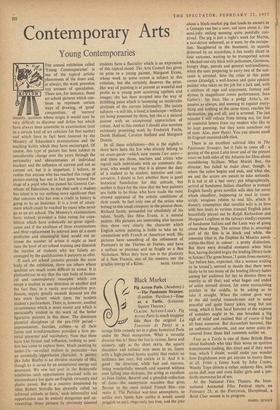Black Market
Pig Across Paris. (Academy.) —The Passionate Stranger. (London Pavilion.)—True as a Turtle. (Leicester Square Theatre.) CLAUDE AUTANT-LARA'S Pig Across Paris (a much snappier title than the original La Traversje de Paris) is a savage little comedy set in a glum hysterical Paris under the Nazi occupation. What a versatile director this is! Here the fun is vicious, fierce and salutary, ugly as the short skirts, the square shoulders and turbans now seem to us, funny with a high-pitched hyena quality that makes an audience not roar, but cackle at it. And it is good : the direction, while fast and raucous, being wonderfully smooth and assured without ever falling into slickness, the acting as excellent as Jean Cabin, Bourvil and a ghoulish collection of faces—the anonymous macabre that gives flavour to the most insipid French film—can make it. The Parisian war-time atmosphere, so unlike ours (quite how unlike it would sound priggish to say), rings only too true, and the joke
about a black-market pig that lands its owners in a Gestapo van has a sour, sad taste about it : the semi-jolly ending seeming quite painfully con- trived. The pig is just a night's work for Martin, a taxi-driver unhorsed, as it were, by the occupa- tion. Slaughtered in the basement, its squeals drowned by an accordion, it lies neatly sliced in four suitcases, waiting to be transported across a blacked-out city thick with policemen, Germans, hungry dogs, patrols and general unfriendliness, when the man preparing to carry two of the suit- cases is arrested. Into the crisis at this point comes Grandgil, a well-known and quite opulent painter who takes on the job for a lark and, with a mixture of rage and enjoyment, fantasy and slyness (a magnificent comic performance, Jean Gabin's : his face, like a podgy Aztec's, im- passive as always, and seeming to register every- thing and nothing at the same time), reaches his destination, pig and all; and is arrested. The last minutes I will refrain from letting out, for fear of resentful letters from my readers who like to be kept guessing; but they seem somehow out of tune. Alas, poor Paris! You can almost smell its fragrant unmistakable stink.
There is an excellent satirical idea in The Passionate Stranger, but it fails to come off : a guying of the great Latin lover and of the present craze on both sides of the Atlantic for films about smouldering Sicilians. What Muriel Box, the director, has failed to make clear, though, is where the satire begins and ends, and what she, we and the actors are meant to take seriously. It is not at all a bad story; put telegraphically, arrival of handsome Italian chauffeur in tranquil English family gives novelist wife idea for novel which chauffeur, happening to read in manu- script, imagines relates to real life, which it doesn't; assumption that novelist wife is in love with him leads to various tranquil English jokes beautifully played out by Ralph Richardson and Margaret Leighton at the (always kindly) expense of handsome Italians and the Latin way of going about these things. The serious (that is, amusing) part of the film is in black and white, the nonsense (that is, the Daphne du Maurier novel- within-the-film) in colour : a pretty distinction. But there were dreadful moments when Miss Box, having decided to guy the lending library taste in fiction (The great house,' I quote from memory, lay before him, expectant, like a woman waiting to be kissed'), seemed to decide that there were likely to be too many of the lending library ladies among her audience for her to dismiss them as merrily as all that; and what began and ended as' satire seemed almost, for some excruciating patches in the middle, to be asking us to take it straight. When the colour gave way to the old restful monochrome and to some peaceful and quite funny jokes, snug but not smug, which is how local humour at the expense of outsiders ought to be, one breathed a big sigh of relief and realised that of course it had all been nonsense. But discomfort hovered, like an asthmatic usherette, and one never quite re- covered from those bad moments earlier on.
True as a Turtle is one of those British films about husbands who take their wives on sportive honeymoons (sailing, this time) and if they were true, which I doubt, would make you wonder how Englishmen ever get anyone to marry them at all. From a funny book by John Coates, Wendy Toye directs a rather unfunny film, with some dull men and even duller girls and a per- fectly enormous lot of sea.
At the National Film Theatre, the Inter- national Animated Film Festival starts on February 23; at the Everyman, Hampstead, a Rend Clair season is in progress.
ISABEL QUIGLY










































 Previous page
Previous page